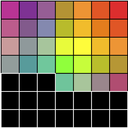
This is the day of Netzach within Hod, eternity within humility. The pairing of these s'firot conjures in the mind the inherent contradiction between striving to become better and accepting ourselves as we are. Is it possible to do both at the same time?
The New York Times op-ed columnist, David Brooks, wrote an essay this week about the lack of self-confidence in women, which is generally seen as a problem, as compared to overconfidence (especially in men), which Brooks says is actually a much greater problem in our society.
Brooks writes:
Much of the recent psychological research also suggests that overconfidence is our main cognitive problem, not the reverse. Daniel Kahneman’s book “Thinking, Fast and Slow” describes an exhaustive collection of experiments demonstrating how often people come to conclusions confidently and wrongly. When asked to estimate if more murders happen in Detroit or in Michigan, most people give higher estimates for Detroit even though every murder in Detroit also happens in Michigan.
In truth, this is a question that Judaism has been pondering for thousands of years. Jewish answers, generally speaking, say that the apparent paradox can be resolved when we consider that, although we are small and powerless compared to God, we also have been given a special and undeserved role in creation. Our mandate is to strive toward understanding and to help repair the world. We are small creatures who have been given a big job.
That answer, though, does not negate the truth that it is difficult to balance our pride and humility. Both self-confidence and self-doubt are necessary, but it is hard to hold onto both in our minds at the same time. Like Brooks, I tend to believe that our humility is a better friend to us than is our pride. A lack of self-confidence can hurt us, but we are more likely to be at our best when we have a realistic view of ourselves supplemented by a tempered dose of ambition.
That mindset also has the benefit of taking our attention off of our egos. It is better to place our focus on our task than on our selves. As Brooks says, "It’s probably easier to go through life focusing on what specifically needs doing, rooted in a set of external obligations and criteria and thus quieting the self."
On this 32nd day of the Counting of the Omer, I commit to doing acts of audacious humility, striving to do what is right while also accepting my limitations and the reality of the world around me.
May this be a day in which you find the drive to do what needs to be done in this beautiful world that you did not make and which you did nothing to deserve.
For the introduction to the Counting of the Omer, click on this link:
The First Day of the Counting of the Omer

 RSS Feed
RSS Feed
